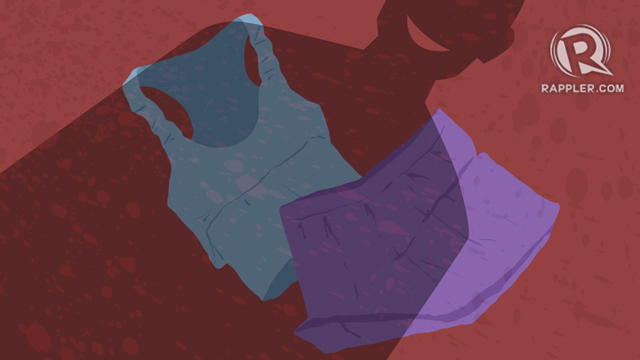Dangerous times for women in a culture of rape in the PH
Days later, a 19-year-old adolescent from Samal Island, Davao, was raped and killed by a male neighbor. In another San Jose del Monte, Bulacan case, a 13-year-old male neighbor raped a 5-year-old girl, tied her neck with a wire to kill her, slid her in a sack, and threw her lifeless body.
In another incident in Nueva Ecija, an 8-year-old girl was raped and killed by a carpenter living with the family who was just recently out on parole for qualified theft.
There are many other rapes and attempted rapes that happen in the Philippines. These rapes and rape-slays must stop.
There is something very wrong in how the Philippines is raising its men, women, boys, and girls where these hapless women victims fall prey to rapists and killers. It is a society, a culture, an educational and justice system that raises rapists and killers. We have failed as a society to make women and young girls free from such violent acts.
Where is the outrage? These women and girls cannot just be part of statistics.
A society that is patriarchal, full of machismo, and utterly lacking in respect for women will fodder these violent acts. It is disgusting and offensive how some would think that rape is a joke and find it even funny and laugh. This too must stop.
The entire country has fallen short of addressing the issue of rape. Based on 2015 PNP statistics, at least one Filipino woman was raped every 58 minutes. One in 3 adult deaf women are victims of rape. Although rape and rape-slays in our country are persistently reported, many cases filed by rape victims are still dismissed by prosecutors and judges, denying justice to the women and girls.
We need to join hands to actively prevent, efficiently investigate, and effectively prosecute these rapes and rape-slays. Part of prevention is going back to the basics and teaching in schools and communities respect for women, upholding the human rights of women, informing women and girls about schemes used by rapists, and impressing upon the community the importance of accountability and laws penalizing offenders.
Intensified prevention efforts must be done in schools and communities to conduct human rights-based modules on sexuality education and gender-based violence, otherwise, we will be looking at heightened numbers of violations of women's rights. Community patrols, lighted pathways, and CCTVs can help as well.
As to investigation, we need the likes of Police Superintendent Jaime Rodrigo Leal, the chief of the Baguio Crime Laboratory, who has been collaborating with SOCO in rapes and rape-slay investigations to gather evidence at the crime scene, from clothing and bodies of the victims and perpetrators, and even from the maggots of decaying bodies, and who actively have the DNA samples analyzed by the Crame DNA Laboratory. We need the police to gather crucial evidence such as tape receipts that lead to CCTV footage of stores where rapists are seen purchasing items.
We need prosecutors, judges, and justices to step up in effectively prosecuting and holding the perpetrators accountable. We need the lawyers of the Office of the Solicitor General to file the necessary appeal to the Supreme Court once a rape perpetrator is acquitted. Every acquittal of a rapist will place young girls and women at risk as perpetrators become emboldened to commit further rapes with impunity. Statistics to compare the complaints filed before the prosecutor, dismissed by the prosecutors and courts, and those appealed to the justice department and to the Supreme Court on certiorari are not easily accessible.
We need medical providers to provide information and access to emergency contraceptives to prevent pregnancy resulting from rape. There are no statistics available on the number of women who have become pregnant as a result of rape, but we have data showing that one in every 9 women who induce abortion are rape victims, clearly showing the pervasiveness of the problem.
We still do not have a national anti-stalking law. Our current anti-sexual harassment law does not cover street sexual harassment when the offender and victim are not co-workers, employers, co-students, and teachers. Although other crimes may be filed for such offensive acts, the penalties and prescriptive periods are low, placing women and girls at risk as many sexual assaults start from stalking and sexual harassment.
Over 130 countries have registered emergency contraceptive pills (ECPs) that prevent pregnancy resulting from rape, yet the Philippines has no registered dedicated ECPs. Many are not aware that different methods of emergency contraception such as the Yuzpe method using combined oral contraceptives within 5 days can prevent pregnancy resulting from rape. There is even a need to revise the Reproductive Health Law as it currently restricts access of rape victims to ECPs by disallowing national government hospitals from purchasing ECPs, allowing only the local government hospitals to purchase and dispense ECPs.
Many HIV testing and counseling centers are not aware that rape victims can prevent HIV transmission by availing of post-exposure prophylaxis within 3 days from the rape with the 28-day regimen of anti-retrovirals.
The government needs to increase its number of DNA laboratories as there is only one PNP DNA laboratory and one NBI DNA laboratory for the whole country. We need more medico-legal officers and more psychiatrists and psychologists who offer counseling for rape victims.
It is even very common for girl rape victims to wait 3 months before they receive any form of psycho-social counseling. Many provinces and cities have not established their rape crisis centers despite the requirement of Republic Act 8505 that rape crisis centers be set up in every province and city.
Until now, the government has not paid compensation for Karen Vertido, a rape victim-survivor, despite the recommendation by the CEDAW Committee in 2010.
Rape victim-survivors must be given credence for effective prosecution of cases. Providing training for the pillars of the criminal justice system is important. All these efforts need the necessary funding support to end this culture of machismo and impunity of rapists to make our country safe for Filipino women and girls.
Rapists belong in jail, not in our streets. – Rappler.com
Clara Rita Padilla is the founder and executive director of EnGendeRights. She has proposed language for draft bills and ordinances that have been passed into law, including the Anti-Sexual Harassment Act, the Reproductive Health Law, and the Expanded Anti-Trafficking Law. She holds a Juris Doctor degree from the Ateneo de Manila University and has been practicing law for over 23 years.


Comments